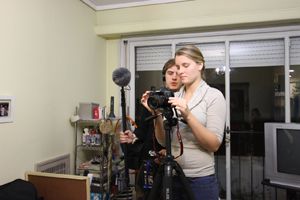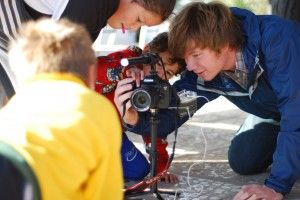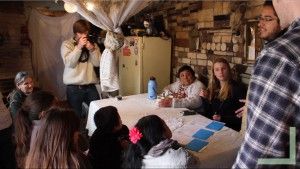Each year, dozens of Pepperdine students get the chance to encounter the people of Argentina when they study abroad in Buenos Aires. The rest of the student body will get the opportunity to encounter some of the work being done to address the country’s poverty when the Pepperdine Microfinance Club premieres its new documentary, “Banking on Trust,” tonight in Elkins at 7 p.m.
The documentary, which features a depiction of microfinance and its positive effects on the poor in Argentina, is the latest venture from the microfinance organization, which over the past two years has raised more than $10,000 to loan out to people in more than 40 different countries on five different continents.
“We realized that ‘this isn’t very hard’ and we’re a bunch of college students, so we thought we should make a movie to demonstrate how you can help people like that without ever leaving your computer screen,” club president Becca Faulkner said.
The idea for the documentary was conceived, along with the club itself, after the fall 2009 semester in Buenos Aires, where Faulkner learned about microfinance during a trip to Adulam, one of the communities receiving microcredit loans and featuring heavily in the film.
“It’s exciting for people that went [to Argentina] because they get to see some familiar faces.” Faulkner said.
After returning to Pepperdine and establishing the club with senior LeeAndrea Morton and alumna Rachel Williams (’11), filming in Argentina went throughout the month of June 2011 with Faulkner, Williams and Morton, as well as alumnus Stan Parker (‘11) and USC Film School student Tim Heaphy. Along with guidance from Professor Susan Salas, the project received full funding, including grants from the Offices of the President, Provost, Dean of Seaver College, and Vice Provost for Research and Strategic Initiatives, and the Center for Faith and Learning.
The film has three sections featuring different areas in Argentina with different socio-economic conditions: rural poor in Adulam; suburban neighborhoods in Rosario; and urban shantytowns in Cordoba.
“You get the whole spectrum of microfinance in Argentina in 40 minutes,” Faulkner said.
The footage was brought back to the United States for post-production with Heaphy as director of photography, Parker as editor and Faulkner doing Spanish translations as well as music from senior Houston Fry.
“I hope people like it.” Parker said. “The people we interviewed and met are the people who depend, really, on microfinance, so I hope the audience feels like they got a chance to meet those people and see that there are opportunities to help them, and microfinance can be a tool for that.”
Based off the system developed by Nobel Laureate Muhammad Yunus and his organization The Grameen Bank, the basic idea of microfinance is making small loans with low to no interest to potential entrepreneurs in impoverished areas for the purpose of starting a new business venture. If successful, the new business will improve the economy of the area, and will be able to pay back the original loan, which is then re-loaned to other people.
“It’s cool because all the money we loan is always paid back to us, so we can keep going for a long time, even if fundraising goes down for a little while,” Faulkner said. “Of the 10,000 we’ve loaned, over 98 percent has come back.”

